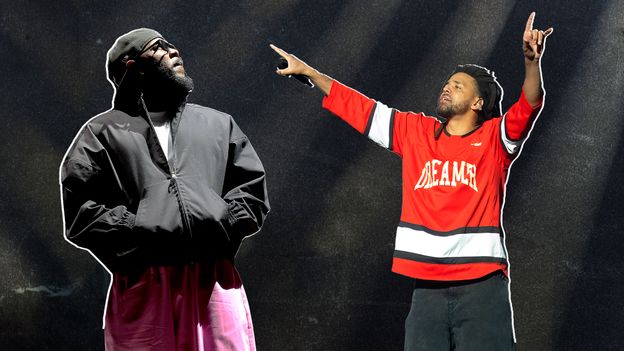It seems Cole himself ultimately agreed, calling it a “mis-step”, promising to update it or remove it from streaming services. The rapper said he’d felt pressured into it because “the world wanted to see blood” and, indeed, some fans on social media seemed disappointed that the “beef” was over so soon. But many others applauded Cole for what they saw as an act of maturity. Charlamagne Tha God said he had “nothing but respect” for Cole, and saluted him for “breaking the cycle”.
This latest feud comes just a couple of months after Megan Thee Stallion and Nicki Minaj traded insults on record. The former’s track Hiss, referenced Megan’s Law, a piece of legislation that requires public disclosure of information about sex offenders. Minaj took this as a reference to her husband Kenneth Petty, who is a registered sex offender following a 1995 attempted rape conviction. She responded with the song Bigfoot, apparently mocking the incident in which Megan was shot in the foot. The track was widely criticised, with Shamira Ibrahim writing in the Guardian that it was “a rare stumble for Minaj” and a “reductive tactic”. With Cole regretting – and retracting – his track, and Minaj receiving condemnation for hers, could this be the end of the diss track, as we know it?
A decades-long trend
Diss tracks – songs that intentionally disrespect others, often fellow musicians – have long been associated with the hip-hop genre. A natural progression from battle rap, where musicians trade insults on stage, diss tracks came to prominence in the 1980s, most famously with The Roxanne Wars, an exchange of 50 diss tracks by more than 30 artists.
Over the years, hip-hop feuds have inspired some of the genre’s most memorable tracks, including Jay-Z’s Takeover (on which he calls Nas “just garbage”) and 2Pac’s Hit ‘Em Up, a furious tirade in response to The Notorious B.I.G’s 1995 track, Who Shot Ya?
But while the term itself may have come from hip-hop, the concept of throwing shade at someone via song goes back decades. In the 1950s, R&B star Joe Tex called out his musical and love rival James Brown by name in the song You Keep Her. John Lennon targeted former bandmate Paul McCartney in 1971’s How Do You Sleep?. In 1974 Lynyrd Skynyrd took aim at Neil Young in Sweet Home Alabama.
More like this:
• The song that’s the key to Cowboy Carter
• Is Michael Jackson’s image being cleaned up?
• The surprising history of a classic breakup song
Familiar themes of diss tracks are questioning someone’s credibility or talent, “clapping back” at personal slights (such as Gwen Stefani on Hollaback Girl) or calling out an ex-lover or friend (Miley Cyrus’s Flowers). They can be funny or savage. They can also – to the delight of the public and dismay of the subject – reveal intensely personal information. A back and forth between Drake and Pusha T resulted with the latter revealing that Drake had a son in The Story of Adidon.
Sometimes artists are explicit about who they’re calling out – like Eminem on one of his many tracks about Mariah Carey (she responded with one of her own: Obsessed). Other times they’re more cryptic, leaving the listener to try and identify the subject of their ire, which can add to the appeal. Carly Simon’s 1972 track You’re So Vain was variously thought to be about David Bowie, Mick Jagger, Cat Stevens and James Taylor until, in 2015 she revealed that – some of the song at least – is about Warren Beatty.


